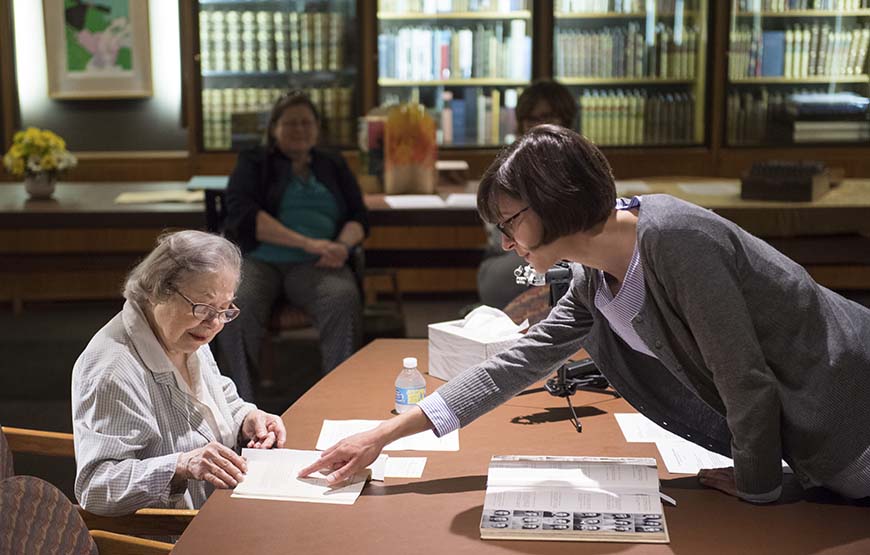
As Assistant Archivist for the university, I have the honor of conducting and recording oral histories with members of the CMU community. Carnegie Mellon is well-known for its creative and innovative talent, from the pioneering work of Herbert Simon and Allen Newell to the dramatic talent of student performers in Scotch ‘n' Soda. We launched the Carnegie Mellon University Oral History Program early last year in hope of capturing first-hand the stories and experiences of students, faculty and alumni who lived historic moments—think StoryCorps with an academic edge. We record these conversations and preserve them in the University Archives for future generations, and all of the recordings are openly available for anyone to research and study.
At the University Archives, we aim to identify, preserve, and share the documents, photographs, and objects that tell the story of Carnegie Mellon University's vibrant history. Our over 5,000 feet of records include the papers of ground-breaking thinkers such as Herb Simon, Allen Newell, Joseph Traub, and Clifford Shull.
Anyone is welcome to use our collections, whether it is to view photos of the construction of the College of Fine Arts or to study the history of scientific inquiry in the records of the Mellon Institute for Industrial Research. As archivists, we are absolutely committed to the preservation and dissemination of our collections and we are excited to share them with in-person and online visitors alike.
The Carnegie Mellon University Oral History Program helps us to supplement and complement our document-based collections with the real-life memories and perspectives of those who experienced the history of our organization. These interviews do not just inform us of the events histories—they tell the story of how the events were experienced.
Recently I conducted a series of interviews with three remarkable alumni community members that I am especially excited to share. Although they come from differing backgrounds and have dissimilar experiences, they each echoed the same passion for life and for learning that struck me as inspiring.
Vivian Davidson Hewitt graduated from Margaret Morrison Carnegie College where she studied Library Science in 1944. I interviewed her on May 20, 2017, just after she received an Honorary Doctor of Humane Letters from the university. At 97 years old, she has an incredible memory and she told me about her life's accomplishments in fluid and vivid detail. Despite challenges and prejudice that she encountered through the years, she expressed a passion for life that left an impression on me: 'I've been blessed and I've been lucky, because I'm so glad that I married John Hewitt, and that after two and a half years he took me to New York where I met people of the Harlem Renaissance, and had the positions that I had. I'm the only librarian who has been Chief Librarian at Rockefeller Foundation, Carnegie Endowment for International Peace, and the Counselor for Relations as Assistant Chief Librarian, but it's been a time, wonderful life.'
Anita Newell, another alumna of 'Maggie Murph,' graduated in 1947 with a degree in Library Science. I interviewed her on August 4, 2017 when she was 93 years old. As she talked about her life, she emanated a curiosity for learning that was infectious and caused everyone in the room, myself included, to smile. Fleeing the turmoil in Europe in the 1930s, her family immigrated to the United States from Romania shortly before she entered kindergarten. Education was an important part of her childhood and her later life. She recalled that as a small child 'learn' was one of the first English words used by her parents: 'I think the first English word my mother got to know was the word "learn," because the Jewish word "to learn" is lern. Lern. We heard that word a lot. So the idea of going to school and learning was number one for the both of us as children. And that was very lucky for us because it made us feel, both me and my brother, that what we were doing was so very important. And we observed that. It did hit us. We got to think like that, lucky for us.'
Alumnus Barry Pearl studied drama at Carnegie Mellon University and he graduated in 1973, three decades after Hewitt and Newell. I interviewed him on August 3, 2017. We know him best from his role as Doody in the film version of Grease (1978). It was amazing to hear about his life but when he spoke about his recent teaching work with Inclusion Films, the passion in his voice was inspiring:
'Joey Travolta…opened up this company years ago called Inclusion Films where he shepherds folks on the spectrum of autism, Down Syndrome, cerebral palsy, Asperger's. And he has found that their ability to express through the arts is really a thing and how they come out of themselves. It's amazing to watch the growth of these folks because they're able to use the art to communicate… to work with these kids and adults on the spectrum makes you feel like getting up every day is well worth your while when you can bring such joy and love into the hearts and the minds of all kinds of folks.'
I feel honored and privileged that Vivian, Anita, and Barry shared their remarkable stories with me. Oral histories give perspective and personal meaning to the past, and they impart important wisdom and life-lessons that help us to better understand the social context of the time – stuff that is usually not found in a paper document or a photograph. As I continue to conduct interviews with members of the university's creative and talented community of students, alumni and faculty, I will carry these lessons with me.
If you would like to learn more about the Oral History Program or about our other collections, contact us at archives@andrew.cmu.edu or (412) 268-5021.
by Kate Barbera, Assistant Archivist
